Tenet (2020)
Directed by: Christopher Nolan
Written by: Christopher Nolan
Starring: Elizabeth Debicki, John David Washington, Kenneth Branagh, Robert Pattinson
USA
IN CINEMAS NOW
RUNNING TIME: 150 mins
REVIEWED BY: Dr Lenera
A CIA agent awakes from a botched operation and is recruited into a secret organisation, given only the word “tenet” and a cross-fingered gesture. He learns that in the future, technology has been developed which allows objects to have their entropy reversed and move backwards through time. After recruiting fixer Neil, he sets out to track the manufacturing origin of some reversed bullets and comes up against arms dealer Andrew Sator and his battered wife Kat, and a world-threatening plot that’s actually worse than a nuclear apocalypse….
It was obvious that Christopher Nolan would eventually write and direct a film involving time travel. Memento was a film whose scenes played in reverse chronological order. Inception had parallel sequences running together taking place in real time and ‘dream time’. Interstellar had hours in space equating to years on earth. And Dunkirk consisted entirely of three different timelines running at very different speeds. However, Nolan being Nolan, Tenet isn’t your typical time travel adventure. It’s based around the ideas that objects and people can have their entropy reversed allowing them to go backwards in time. What is entropy? I admit that I didn’t know until I looked it up. Let me quote the ‘Free Dictionary’: A measure of the amount of disorder in a system. Entropy increases as the system’s temperature increases. For example, when an ice cube melts and becomes liquid, the energy of the molecular bonds which formed the ice crystals is lost, and the arrangement of the water molecules is more random, or disordered, than it was in the ice cube. This probably sounds more complex than it needs to be; all you really need to know is that here, it’s not so much traveling into the past as traveling backwards that takes place. This allows Nolan to create several breathtaking thrill sequences where characters are engaged in vehicle chases or gunfights where either their opponents, helpers or even themselves are going in a different direction in time to everyone else, scenes that may have been laughable or confusing in the hands of many other film-makers.
Much is riding on Tenet. When it was obvious that Covid was going to be here for some time, distributors postponed most of their films to many months or even a year ahead, or released them to streaming. Warner Bros. did postpone Tenet‘s release date a few times, but not to a huge degree, the company and Nolan sticking to their guns of wanting it to be the first really big movie on release once cinemas reopened, to be the one that drew people back to the pictures. While I’m in full support of this, many have criticised their stance for being either irresponsible or just dooming the film to be a commercial failure. Well, we won’t know the answer to the latter for a while, though I will say that, out of the four movies I’ve been to see since picture houses re-opened, the screen in which I saw this one was by far the fullest. And it really is a film you have to see [and hear] on a big screen, it’s Big in every way; big concepts, big action sequences, big length, big sound, you name it. The combination science fiction/spy thriller shows that Nolan clearly hasn’t got that 007 bug out of him yet, even if in terms of look and direction it’s a bit closer to a Bourne movie. But does it continue Nolan’s quite astonishing run of quality? I gather that reviews are mixed, but I would say that it does, just about. Lacking the cohesion of Dunkirk and the emotion of Interstellar, it’s driven at a fast and furious pace and the plot is full of surprises, though it does suffer a bit from some weak characterisation. However, I don’t recommend that you go and see it if you want to switch your brain off and relax; even more than his other work, you’ll need to totally focus on what’s happening on screen in order to keep up with the twisty plot that constantly throws information at you!
So we begin in Kiev where a terrorist organization launches an attack on an opera house. Even though we cut away from any graphic violence, it’s quite intense as musicians are murdered and the audience is gassed into unconsciousness while bombs are set around the auditorium . But in there is a plant – the film’s main protagonist, a CIA agent known as – well – The Protagonist in the credits, who has a different agenda entirely. He takes a mysterious object and sends part of his own team out through a secret exit with it, and also encounters some bullets that seem to go backwards. After being saved by a masked gunman with a red string on his backpack [remember this detail], he rejoins the Russians, who realise that they’ve been tricked and torture him. He bites on a suicide pill before revealing any information, then wakes up to be told that the pill had been fake, and that the Russians have caught and killed all of his team members and taken the unidentified object. He’s then recruited into this mysterious agency and learns and sees evidence of more objects being sent from the future than just bullets. He and new partner Neil infiltrate the compound of an arms dealer, Priya, because she sold the bullets, but she tells the pair that the bullets had been normal when she had sold them, and that a man named Andrei Sator, who can apparently communicate with the future, had reversed them. To reach Sator, the Protagonist gets near Sator’s wife Kat. The brutal Sator has her under his control due to a forged painting that she sold to him, and will take her child away from her if she tries to leave him. Elizabeth Debicki’s character is a tad lazily written though it’s a rather refreshing change in these times to have a female who needs to be rescued, even though no doubt some are whinging about this as I type.
There’s a plot to steal a painting, another plot to crash a Boeing 747 [and yes, it’s a real one that’s crashed], plus there are encounters violent and not so violent with criminals, along with much zipping all over the world, plus the expected Michael Caine cameo, as our duo try to get to the person controlling everything and find out what he or she is really up to – and when we do find out the latter it’s a real doozy. Meanwhile Neil seems awfully evasive about himself. The pace at which this all moves is quick right from the offset, but the first third is perhaps too fast what with all the story turns we have to process. Even if you lose attention for no more than a couple of lines, you may wonder why our heroes are going where they are or doing what they’re doing, why they’re bungee-ing up a hotel or attempting a heist via moving vehicles. But, typically, Nolan keeps CGI to a minimum, and I just love his commitment to this and shooting on film rather than digital, even though on a few occasions he goes a bit more ‘shakycam’ than he needs to; I thought he’d stopped employing this tiresome and pointless device ages ago. Considering the basic premise special effects are kept to a minimum, Nolan going for as gritty and realistic approach as he can in a film where, for example, several major sequences are then revisited and shown playing out the other way round in time [it’ll make sense when you watch it]. Of course he still likes the have the music score turned up very loud, and Ludwig Joransson’s pulsating soundtrack certainly helps to drive things along, even though it would probably be a boring listen away from the film. Like so many other current composers, he mimics Nolan’s usual composer Hans Zimmer. Reports of being unable to hear dialogue seem strange to this writer though; he had no trouble hearing everything [Interstellar‘s another story though].
It’s mostly serious stuff, even some potentially daft moments where characters are trying to carry out a mission while also seeing themselves two hours ahead in time. However, there’s slightly more lightheartedness than other Nolan pictures. The Protagonist has some vaguely funny interactions with Neil and a big security guard, and one scene where the Protagonist asks questions about time travel seems like Nolan’s answer to that stupid scene in Avengers: End Game which rubbished a load of time travel films which made some kind of sense [well, as much as one ever can] before we got a load of plot holes and questions come that film’s conclusion. Near the end we hear an amusing variant on the final line from Casablanca and then a terrific final twist. But Tenet is quite a cold film which may prevent total engagement. “Don’t try to understand it, just feel it”, The Protagonist is told at one point, but there’s not much to feel. Whether The Protagonist taking huge risks for Kat is down to some chivalric sense of duty or because he fancies her, we don’t really get a sense of either, meaning that a final scene just isn’t as touching as it should be. Despite John David Washington certainly possessing the charisma of his dad Denzel, and being given some very cool moments such as when he bests three heavies using things like a cheese grater with seemingly little effort, he’s barely given a character to play, and Robert Pattinson [he’s more than atoned for Twilight by now] as Neil tends to take over some their scenes together. Kenneth Branagh as Sator repeats his somewhat iffy Russian accent from Jack Ryan, but he’s quite terrifying in his scenes with Debicki.
A few seconds of Sator kicking Kat while she’s on the ground has been removed from the UK version in order to get that apparently all-important 12A rating. While I haven’t seen the original version, the scene in question doesn’t seem to suffer from its shortening, though this frequent censoring to get a lower rating is absurd in the case of something like Tenet which I can’t imagine many people of 12 years and younger wanting to go and see and then understanding. As I finish writing this review three hours after returning home from the cinema, I myself am still pondering on a few details relating to the main character which seem to be rather vague, though that’s possibly more a case of Nolan leaving some things for us to think about rather than holes in the story line. Or maybe there were a few instances, probably lasting just a few seconds, where I tuned out because my brain was being overloaded far too rapidly, and therefore failed to pick up some things? Tenet is easily closest to Inception out of all of Nolan’s films and at times comes across as a virtual companion piece. I think that watching the two one after the other might be an interesting experience. I wish that it wasn’t so chilly, but it’s still a strong and at times quite stunning effort from one of the few directors these days who seems to have created a sort of brand, and who is able to draw people in to see his films based largely on his name.
Rating: 










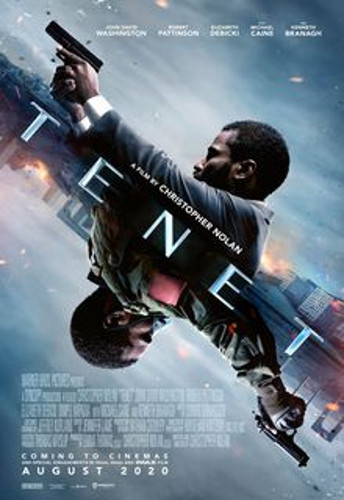
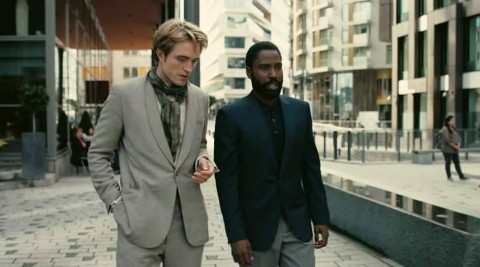
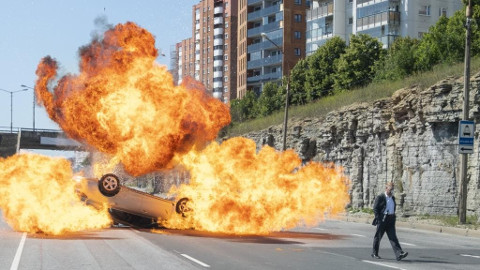


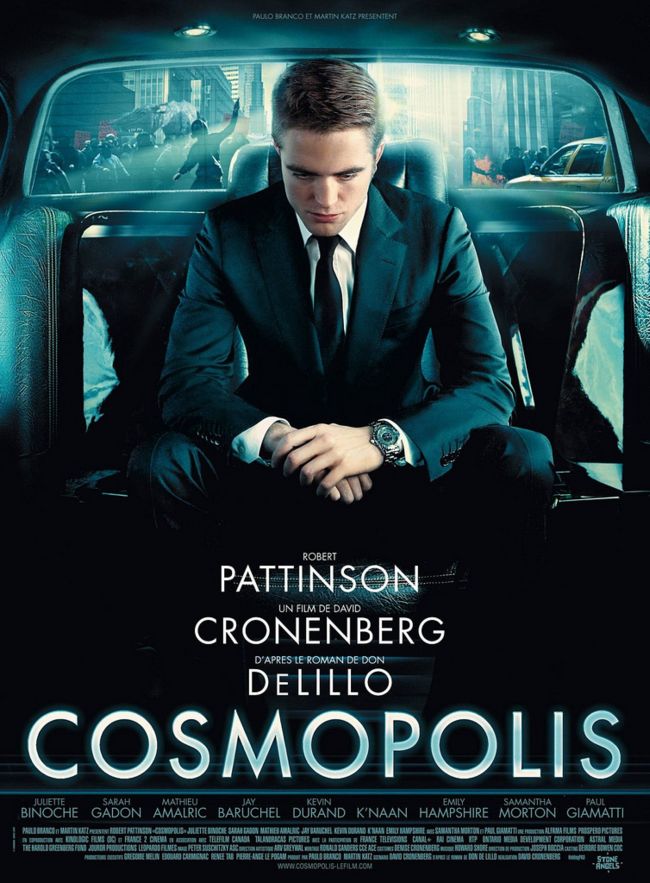
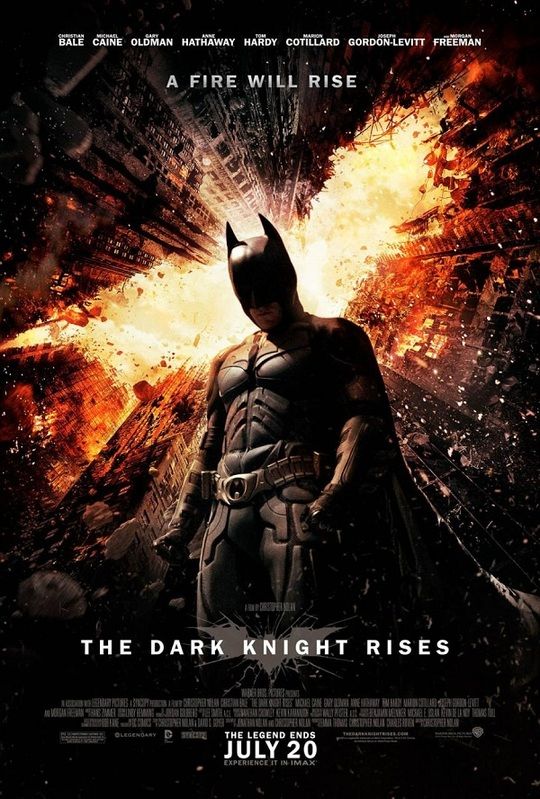
Be the first to comment